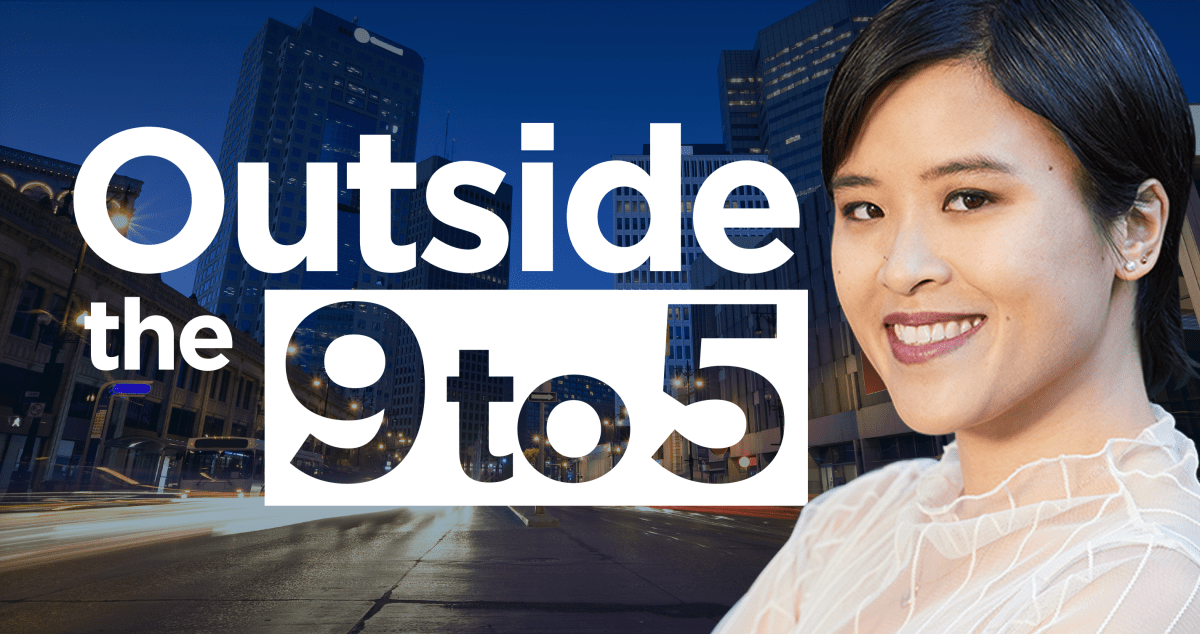You all know the millennial — you might work with one or even be one yourself. They’re ambitious and achievement-oriented, but lazy and entitled. Oh, and they’re demanding, what with their constant feedback-seeking and authority-challenging. And what’s up with the obsession with avocado toast?

If that sounds familiar to you, it’s because Entitled Millennial™ is a trope of the 2010s, eventually becoming a favourite catchall term of OK Boomers™ (i.e. older generations at large) to describe younger generations — including Generation Z — who are shaking things up when it comes to how we work and play.
I say it’s a trope of the 2010s because in 2021, this simplistic binary of Entitled Millennial vs. OK Boomer is on the way out, as it should be. There’s so much nuance in the evolution of work that deserves to be explored and unpacked, which is what I hope to do in my new Global News column, Outside the 9 to 5.
Twice a month, I’ll look at one aspect of how young Canadians between the ages of 18 and 40 are navigating modern #worklife. Company culture, pay, benefits, hours, organizational structures, office setting, what it means to be successful — everything is changing, so all of it is on the table.
- Roll Up To Win? Tim Hortons says $55K boat win email was ‘human error’
- Bird flu risk to humans an ‘enormous concern,’ WHO says. Here’s what to know
- Halifax homeless encampment hits double capacity, officials mull next step
- Ontario premier calls cost of gas ‘absolutely disgusting,’ raises price-gouging concerns
It’s been said that for millennials and gen Zs, a healthy work-life balance is essential. According to the Environics Institute’s 2017 “Canadian Millennials: Social Values Study,” 79 per cent of respondents said that achieving balance between work and their personal life is “critically important.” More recently, a 2020 study by PricewaterhouseCoopers, which included respondents from Canada, reported that 95 per cent said work-life balance is important to them. The same largely goes for gen Z.
But “balance” doesn’t quite capture the nuance that exists here. Indeed, it seems almost quaint — an old-fashioned term that hearkens back to a time when workers saw their lives divided into two neat categories: home and office. It was a pre-COVID-19 era when we thought we could compartmentalize our lives, erecting emotional barriers that prevented messy spillovers from leaking into one world from the other. But this notion, as many millennials and gen Zs know, is simply unrealistic.
Bringing our “authentic selves” to every setting, whether it’s professional or personal, isn’t just a buzzword or New Age mantra. Much philosophical and psychological research suggests that being oneself correlates with higher levels of life satisfaction and well-being. As a result, it’s not that millennials have an innate, selfish desire to express every thought and satisfy every whim. We’re looking after our mental health.
In a 2020 global survey on mental health, 44 per cent of millennial respondents and 48 per cent of gen Z respondents ranked mental health either first or second when asked to prioritize six aspects of their lives, ranging from personal safety to financial security. So given that we heavily prioritize mental health, it makes sense that many of us intuitively understand the importance of safeguarding it — even when that bumps up against company policy or traditional notions of “professionalism.”

That’s why millennials and gen Zs are far more suited for work-life “integration” than work-life “balance.”
A longitudinal study of 158 university students who completed two questionnaires — one in 1992 and the other in 2012 — found that those who had “holistic career values” at the time of their graduation displayed stronger personal life satisfaction two decades later. That, in turn, caused them to engage in and enjoy their work more.
Holistic career values, according to the study, are “defined as those that emphasize the extent to which a successful career represents engagement in non‐work areas of life and pursuit of intangible goals, such as having flexible work hours and having time for oneself and one’s family.”
The study continues, “Cultivating a holistic career perspective among employees is beneficial for both employee well-being (i.e. personal life satisfaction) and the flourishing of their organizations (i.e. work engagement).”
In other words, prioritizing your life and integrating work authentically into it, rather than seeing work as something separate that you need to balance against life, improves both work performance and life satisfaction.
Who knew being one’s authentic self was a win-win for employee and employer? Apparently, millennials and gen Zs.
—
Anita Li is a media strategist and consultant with a decade of experience as a multi-platform journalist at outlets across North America. She is also a journalism instructor at Ryerson University, the City University of New York’s Craig Newmark Graduate School of Journalism and Centennial College. Anita is the co-founder of Canadian Journalists of Colour, a rapidly growing network of BIPOC media-makers in Canada, as well as a member of the 2020-21 Online News Association board of directors. To keep up with Anita, subscribe to The Other Wave, her newsletter about challenging the status quo in journalism.




Comments